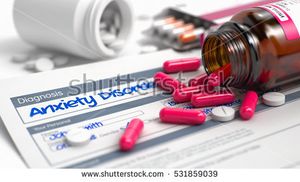The Medicalization Of Depression
Classification of Depression

Depression (mood) is a low emotional state and a loss of interest that affects an individual's feelings, thoughts and behavior. [1] While depression is considered a normal reaction to traumatic events, prolonged depression can lead to major mood disorders and even suicidal thoughts. The symptoms of depression can be mild to very severe. The most common symptoms of depression are feeling upset or sad, loss of pleasure in participating in hobbies or interests, loss of appetite, increase in appetite, increased fatigue and excessive sleeping. The most severe symptom is suicidal thoughts. There are various other medical conditions that may have similar symptoms as depression, therefore careful observations must be used in order to diagnosis and to differentiate depression from other illnesses.
Types and Causes of Depression
Currently there are nine different types of depression that are diagnosable. The most common type of depression is major depression, where it causes the patient to feel extreme sadness, guilt and other negative feelings. This may lead them to have suicidal thoughts or thoughts about death. Some of the other depressions include seasonal depression, postpartum depression, bipolar disorder and Premenstrual Dysphoric Disorder. The types of depression all have a common theme of the patient feelings low emotions, however, there are specific symptoms that are unique to each type of depression. For example, seasonal depression occurs when the patient feels extreme lows due to weather change and postpartum depression occurs after a mother has her baby.
Medicalization of Depression

The medicalization of sadness can be seen as treating feelings of low emotions as a physical illness that requires medical attention. . Although medicalization has become prominent with technological advancements, many are arguing against the bias of medical treatment as the simple ultimate solution. This has resulted in the large accumulation of profit from the sales of various antidepressants. [4] It is frequently marketed to aid in one’s recovery from being “sad”. This has blurred the lines between mild depression that may not require medical attention and severe depression that needs professional attention. In Canada, we have the highest level of consumption of antidepressants that was surveyed among 23 countries by the OECD. [2] High Risks come from overprescribing antidepressants to patients who only show minor symptoms of depression. As mentioned earlier, some symptoms may only be temporary and should not be labelled as depression until further examinations and careful observations have been made. One of these risks include creating an environment for patients to believe that they are more ill than they actually are. We tend to listen to the advice from professionals and if doctors tell their patients that they have depression, their patients may lead them to believe that they are actually depressed.
Intersectionality
From examining the different mediators for depression, it is evident that depression occurs across people from different countries, ethnicities, sexuality and gender. Depression is more commonly seen in females when compared to males, however, females are also reportedly more likely to seek treatment when compared to males. [2] Furthermore, in North America, depression is more common in those who belong to groups of ethnic minorities. This may be due to the difficulties that occur for minorities on an everyday basis, such as career and education struggles since there is a high correlation between stress and depression. Minorities in other areas, such as sexuality also report high percentage of depression. Over 50% of Scottish transgenders were reported to have been diagnosed with depression in a Scottish study from 2012.
Concerns
The medicalization of depression has increased the numbers of antidepressant prescriptions that are being prescribed to people all over the world and this does raise some concerns. Although medical prescriptions may be necessary and can help in some serious cases of depression, over prescribing these medication may create a reliance on these types of drugs for some who may not necessarily need it. It may also create the illusion that one's condition is a lot worse than it actually is. Some critics believe that depression should be treated naturally, such as counselling and psychotherapy, prior to prescribing large amounts of antidepressants.
References
- Summerfield, D. (2012). Depression in the workplace: what is depression?. British Journal of Psychiatry, 201(04), p.327.
- Gender, Mental Health, and Intersectionality.” OpenDemocracy, www.opendemocracy.net/5050/samir-jeraj/gender-mental-health-and-intersectionality.
- Dunlop, Dorothy D., et al. “Racial/Ethnic Differences in Rates of Depression Among Preretirement Adults.” American Journal of Public Health, vol. 93, no. 11, 2003, pp. 1945–1952.
- Roger T. Mulder (2008). An Epidemic of Depression or the Medicalization of Distress?. Perspectives in Biology and Medicine, 51(2), pp.238-250.
- Jacobson, Neil S, and Eric Tomas Gortner. “Can Depression Be De-Medicalized in the 21st Century: Scientific Revolutions, Counter-Revolutions and the Magnetic Field of Normal Science.” Behaviour Research and Therapy, vol. 38, no. 2, 2000, pp. 103–117